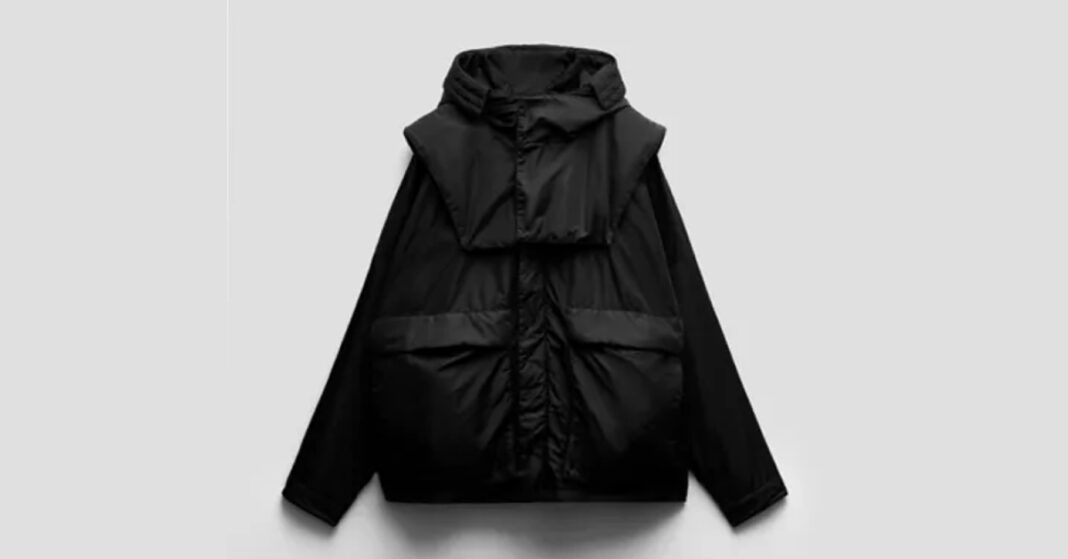Germany-based BASF and Spain’s Inditex announce a “breakthrough” in textile recyclability with the launch of loopamid, a polyamide 6 (PA6) made entirely from textile waste. This marks the first circular solution for nylon apparel made from 100 per cent textile waste.
Zara reports that it has turned the material into a jacket crafted entirely from loopamid, showcasing the potential of this innovation. Inditex, a global fashion retail, encompasses brands like Zara, Pull&Bear, Massimo Dutti, Bershka, Stradivarius, Oysho and Zara Home, operating in over 200 markets via online platforms and stores.
All components of the jacket, including fabrics, buttons, filling, hook and loop, and zipper, adhere to a “design for recycling” approach by being made from loopamid.
Improving circularity in the fashion industry
Loopamid by BASF is a solution to improve the fashion industry’s circularity by recycling polyamide 6 textile waste. Its technology allows for the recycling of various fabric mixtures, enabling multiple cycles while retaining the characteristics of virgin polyamide.
Dr. Ramkumar Dhruva, President of BASF’s Monomers division, says, “BASF has reached an important milestone towards circularity in the fashion industry and pioneered an approach to close the loop for nylon textiles.
“Our loopamid has the potential to revolutionise the PA6 market for the better. We are in the process of scaling up our technology to serve our customers with commercial quantities.”
“The capsule jacket together with Inditex is the proof that circularity is possible, and we are eager to further drive the sustainable transformation of the textile industry,” adds Dhruva.
Inditex collaborates with industry partners to integrate loopamid into garment components, such as fabrics, zippers, buttons, fillings, and fasteners.
Caritas’ ModaRe programme supplies discarded textiles as feedstock, sorted and classified for recycling. The Italian company RadiciGroup transforms loopamid polymer into various yarn types.
The multinational Japanese fastening products company YKK and Velcro companies also contribute to creating plastic components like zippers and fasteners. Spanish company Uniter, Italy’s Tessitura Vignetta, and Germany’s Freudenberg and Gütermann develop garment components like inner labels and sewing threads from loopamid.
Javier Losada, Inditex’s Chief Sustainability Officer, adds, “Driving innovation is key to advancing towards a more responsible industry. This collaboration is a great example of how, by collaborating all together, we can use the new technology to transform textile waste into a new resource.”
“This project is also a first step to move towards a circular solution, as the industry still needs to boost new collecting and recycling capacities in order to close the loop and scale recycling for post-consumer waste.”
BASF and Inditex collaboration
BASF and Inditex are united in their commitment to “ambitious” sustainability goals.
BASF aims to double its sales from circular economy solutions to €17B by 2030. This goal is driven by a focus on three key action areas: circular feedstocks, new material cycles, and innovative business models.
By 2030, Inditex aims for all textile products to be crafted from materials with a smaller environmental footprint: 25 per cent from next-gen materials, 40 per cent from recycled, and 25 per cent from organic sources.
Polyamide 6, or nylon 6, is a synthetic polymer prized for its “excellent” mechanical properties. BASF claims to stand out as a top manufacturer of polyamide 6 and its precursors, boasting production facilities across Europe, Asia, and North America.
Brief about BASF and Inditex
BASF claims to champion sustainability, blending economic success with environmental and social responsibility. With over 111,000 employees worldwide, the firm serves diverse sectors across the globe.
BASF’s six segments include Chemicals, Materials, Industrial Solutions, Surface Technologies, Nutrition & Care, and Agricultural Solutions. In 2022, BASF recorded €87.3B in sales.
Inditex claims to be a global fashion retail giant. The company’s integrated model prioritises quality fashion and customer experiences. Committed to sustainability, Inditex aims for net zero emissions by 2040, reflecting its dedication to environmental responsibility.






